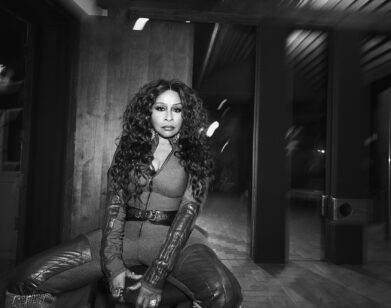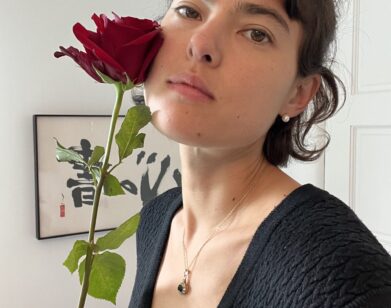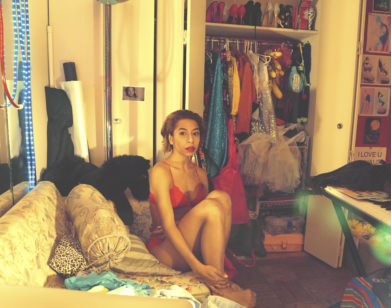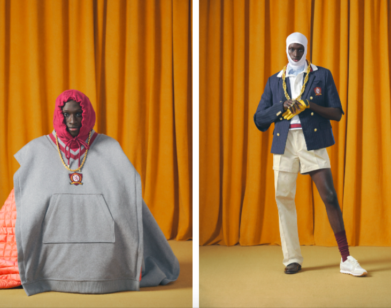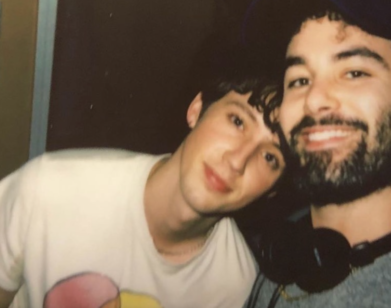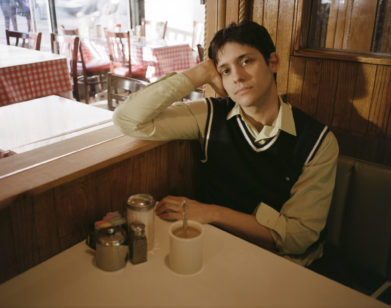ON THE ROAD
Joe Westmoreland Takes Brandon Flynn on a Joyride Through the Annals of Gay History
When Joe Westmoreland’s Tramps Like Us was first released in 2001, it slipped through the cracks. “My publisher had a heart attack the week after it came out,” the author recalls. “I had to do all the promotion myself.” Like so many queer stories, the novel vanished under the weight of more conventional and commercial narratives. But two decades later, it’s been republished with Farrar, Straus and Giroux, and it comes as no surprise to those who read it the first time around that it’s just as urgent—and edifying—today. A blend of memoir and fiction, Tramps Like Us captures a moment of queer adventure and libertinism before HIV was widely understood, told through Westmoreland’s time fleeing his abusive household as he hitchhiked through the country in search of freedom, belonging, and sex. “This book felt like such a lifeline to a history that I feel a part of,” raved the 13 Reasons Why actor Brandon Flynn when he got on a call with the author last month. “They were having fun, figuring themselves out, and diving into friendship fearlessly.” In conversation just before the book’s reissue, the pair got to talking about pen pals, PrEP, and preserving gay history. “I hope some kid like me finds it and sees that there is a future,” Westmoreland remarked. “Or at least, that things will be different.”
———
JOE WESTMORELAND: Before we start talking about my book, I just wanted to tell you something.
BRANDON FLYNN: Okay.
WESTMORELAND: I’m watching 13 Reasons Why, and it’s really good. I’m totally wrapped up in it. I never would have thought to watch a high school drama about suicide. I relate to everybody in it, but Hannah’s mother drives me crazy. She gets on my nerves.
FLYNN: Yeah, the parents remind me of real-life versions of that cartoon, Cow and Chicken. They were always just legs, and you would only hear them. But anyway, it means a lot that you’re watching it. We exchanged a couple of emails, and it’s really cool to meet artists of different generations, especially queer artists. I feel supported by you when you say that you’re watching it.
WESTMORELAND: Well, good. And one other thing that I admired was when Jessica told Justin to go away and leave her alone, you had this gut-wrenching, pained expression. It wasn’t anything you said; it was just this slow-motion face change that was so painful.
FLYNN: Thank you. Justin has big feelings. He’s a deep sufferer. It’s still in my wheelhouse, but at the time, I was in my active addiction. I had no idea what to do with all my pain, and Justin was this perfect outlet. On the note of your book, it feels like this giant qualification.
WESTMORELAND: I know, it definitely is. Everything that I couldn’t say in a meeting, I got it all out there.
FLYNN: It’s incredible. I want to talk about it being republished and the reasons why. It was originally published in the spring of 2001. Can you talk a bit about that circumstance, up until September 11th?
WESTMORELAND: Well, my publisher had a heart attack the week after it came out, so I had to do all the publicity and promotion. He sent it out to the regular bookstore lists and reviewers he had on file, but for many newspapers and magazines, I sent it myself. It was this strange period where the book was out, but we were waiting at the same time.
FLYNN: Has anything changed with you personally, or made you want to put it back out in the world?
WESTMORELAND: No, I think it’s the same. I want the story out there, I want my friends to be remembered. There was so much talk about AIDS and the tragedy of it all, but I felt like the time we had right before AIDS hit was really magical. We were having unsafe sex, sharing needles, and people didn’t want to think about that.
FLYNN: This book felt like such a lifeline to a history that I feel a part of. It didn’t feel downtrodden. They were having fun, figuring themselves out, and diving into friendship fearlessly. I still feel it’s so relevant. I have so many friends who came to New York to get away from traumatic religious backgrounds.
WESTMORELAND: I was definitely fleeing from the Midwest. There weren’t many places to go. When I was hitchhiking, I looked to see where I could possibly live. Key West, maybe, but it was really small. I loved New York, but I didn’t have the money to move here. We had been to New Orleans for Mardi Gras the year before, so I knew what it was like there. These were all little pockets where we were safe, where it was safe to be gay and to meet people.
FLYNN: The Miami and the Key West sequences are my favorite parts of the book. I was texting my friend saying, “Please tell me the snake handler comes back, please tell me the snake handler comes back!”
WESTMORELAND: Yeah, I just reread that and thought, “Oh my god, I could have had sex with that guy. He was really sexy. Why didn’t I do it?” I get why I didn’t make the movie. It started out as a memoir, so I talk about it like it really happened, and most of it did. But there are a couple of chapters that are total fiction.
FLYNN: It’s an interesting journey reading it, because there are so many things that you dive into headfirst. But here, you have this moment of real clarity where your decision is set, and you don’t need to find out any more information.
WESTMORELAND: When I was hitchhiking, it was the last day that it was safe. It wasn’t totally safe, and it’s amazing that nothing really bad happened to me from 17 to 19.
FLYNN: My mom has talked about hitchhiking a couple of times, how you have to remember that it was a different time.
WESTMORELAND: Oh, yeah. I wouldn’t do it. Even a few years after I did it, it got really crazy.
FLYNN: Did you keep a diary?
WESTMORELAND: You know what? I did a little bit. My friend Doug is from New Orleans, and when we first moved there, there were two guys who lived above us, and one of them was a painter. We became pen pals and wrote back and forth for years. I would get a letter from him and answer it almost immediately, and then he would get my letter and answer it. My journals were sporadic, but I was writing what I was doing all the time. When I had the first draft, he had saved all my letters, and I saved all of his letters, and he sent them to me. My memory was close to what really happened, but I was able to double-check it with his letters.
FLYNN: That’s so impressive.
WESTMORELAND: From New Orleans to San Francisco, my dream was to be a writer. I thought I needed to move to New York to be a writer and all that. But I was writing letters. I would read books that I liked, and I would write the author and tell them I liked the book. Sometimes they would write back, but usually they didn’t. I wrote a lot of postcards. I didn’t realize at the time that I was writing.
FLYNN: That’s so cool. Given the fact that there are fictionalized elements, were there any real-life darlings that you had to part ways with when editing the book?
WESTMORELAND: Yeah. I’m rereading it, and I’m about halfway through, in the early part of the San Francisco section. I kept going, “Where’s that chapter?” I thought maybe I spaced out and didn’t read it or pay attention to it. Right now, I can’t even remember what the topic was, but I remember going back, and it was in the New Orleans section, and it wasn’t there. I realized I had to pull it because the story didn’t flow. It was a good story, but it detracted from the book’s story. I also took two or three people and turned them into one person, and there were a couple of events that I made into one event.
FLYNN: That’s not easy to do.
WESTMORELAND: Editing is brutal.
FLYNN: Was anybody upset by the book?
WESTMORELAND: Ali, whose real name was Colby, but originally Ed. I think I say it in the book, that he was “try-sexual.” He had sex with everybody, men or women. He had a girlfriend since high school, and she didn’t want to read the book. A couple of my friends from San Francisco didn’t want to read it because they didn’t want to go back to that time. In real life, I have three sisters and two brothers, but in the book, I have two sisters and one brother. My older brother was like, “Why’d you cut me out?” I had to explain to him that it was too confusing to have too many people in it.
FLYNN: Did you have a conversation with your sister before?
WESTMORELAND: Yeah, both my sisters. My older sister, who my dad was fixated on, and my younger sister, who took out a lot of his anger. My older sister, an English teacher, read different drafts and she would say, “Yeah, that’s okay.” When the book came out, she was in shock. It turns out she never thought I would get a book published, and she was just encouraging me and being nice. Her husband thanked me because it explained a lot of stuff that she had not talked about. She just pushed it all away. I told my whole family that there was going to be some family stuff in there, and they were welcome to read it.
FLYNN: That’s really beautiful, that the book has sorted something out for them.
WESTMORELAND: Yeah, that was one of the reasons I wrote it. I think about young Joe, even when I was in high school, feeling so alone. I hope some kid like that will find it and see that there is a future, and things will get better. Or different, maybe not better, but they’ll have a whole life away from where they are.
FLYNN: 13 Reasons got backlash around Justin Foley’s positive results. He ends up testing positive and dies from untreated complications. The reality is we do have treatments, but he wouldn’t really have that knowledge.
WESTMORELAND: People think AIDS is over now, that you don’t get it anymore.
FLYNN: Yeah. But there’s something amazing about the continuation of these stories. It’s such a big part of our history as queer people. So many of us are these deep searchers, searching for meaning everywhere. This book felt like a nice mirror of someone searching, and somehow in the larger picture of it, there is just some meaning.
WESTMORELAND: Do you know who Anohni is, the singer?
FLYNN: Yeah.
WESTMORELAND: We’re friends, and we were talking about how in New York and San Francisco, it’s like our elders created a safe space for us to come to, and now we have to create a safe space for other people to come to. Ideally, everybody will be accepted, and it won’t be a problem to be gay. Each generation has to welcome the next generation.
FLYNN: Totally. The recording of our history is so important, because we so often forget. I work in the film and TV industry, and the amount of times people say, “This queer idea is so radical and so visible.” I understand why they’re saying that, but also, My Own Private Idaho was fucking radical…
WESTMORELAND: When my friends will ask who I’d want to play me if they ever make a movie or something out of Tramps. I always say, “Keanu Reeves from My Own Private Idaho.”
FLYNN: AI can make that happen.
WESTMORELAND: [Laughs] Right, yeah.
FLYNN: Even going back to you talking about your friend who was “try-sexual,” we now have such prescriptive ideas around identity. Reading Gary Indiana’s book, it’s like, people were just down. The 80s and 90s were such a radical time in queer history. We’ve been visible.
WESTMORELAND: Yeah. At that time, we didn’t even know it. We were just trying to make it through the day, have fun, and deal with everything that was going on. I think your generation, when you get to my age, you’ll say, “Oh, I was in the middle of a whole thing that was going on.” A friend of mine who I knew in San Francisco said, “When we were there, I didn’t realize we were part of a scene. Early 80s San Francisco was a scene, and I thought we were missing everything that was going on in L.A. and London.”
FLYNN: I feel similar to you in that I don’t know exactly what scene I’m in now, or what scene is even going on now. We have this really weird dissociative quality, where the internet is constantly telling me what scene this month is. Also, music is such a big part of your book. It’s so beautifully laced throughout the book. A lot of Joni Mitchell’s Blue.
WESTMORELAND: Oh, yeah, yeah.
FLYNN: Such a good fucking album.
WESTMORELAND: It’s one of the best. I love all kinds of music. That was the soundtrack to my life that I put in there. For certain songs, you would know that it’s from a certain period, so you would get the feel. If you knew the song, you would know what was going on at the time, and I didn’t need to say more about it. The one song that I always go back to was “Sweet Sticky Thing” by the Ohio Players. I heard it all up and down the East Coast, from Miami to New York. The farther into the Midwest that I got when I left New York, it started fading and they just weren’t playing it. By the time I got back to Kansas City, nobody knew that song. And I was like, “Oh, the East Coast has different music than the Midwest does.”
FLYNN: I still remember when you’d lose radio stations, and you’d get back to it on road trips and stuff. But now you have Bluetooth and you can connect anything.
WESTMORELAND: Yeah, Spotify. And making a playlist is really easy now. With cassettes, it was really like an art form, having to stop and find the right end point, get the mood and the right songs together. One thing I liked about 13 Reasons Why was the cassette tapes.
FLYNN: Yeah, there’s a retro feel to it. And the soundtrack for the show has a lot of New Wave and Brian Yorkey.
WESTMORELAND: There’s Joy Division and Echo and The Bunnymen.
FLYNN: I thought it was really effective. We have a couple of minutes left, and I wanted to ask some questions. How do you feel about PrEP?
WESTMORELAND: I think it’s great. I wish I’d had it.
FLYNN: I didn’t know about PrEP until I had a really scary drug-fueled hookup, and then someone’s telling me, “Here, just take this, you’ll be fine.” And I was like, “What?” But as a gay guy growing up, I didn’t go to the doctors, I didn’t want to talk about it. I was talking with my friend who’s younger, and he’s just been on PrEP since he started having sex.
WESTMORELAND: That’s amazing. Yeah, it wasn’t until AIDS hit that we really had sex education for gay men. But you know what? My HIV level now is undetectable, and I’m at the point where I can’t infect anybody. I can’t even really comprehend that exactly, because I’ve been positive since my 20s. But now they’re talking about getting close to not curing AIDS, but eradicating HIV. But I’m also worried about the HIV health stuff being cut. The government funds the pace for a lot of the prescriptions. It’s like they want us to go back to when everybody was sick and dying, and that worries me.
FLYNN: Well, hopefully it doesn’t get there. I think there are enough people who are aware of how important this is, and I feel like it will always be in reach. But that is what’s so essential about this story. Not only is it a horror story for us historically, but it’s a reminder of the alienation that we face, and this disregard that a government can really have for people.
WESTMORELAND: Yes.
FLYNN: I’m curious if you had thoughts about the difference between cruising in 2025 versus cruising when the book’s set.
WESTMORELAND: I’m beyond that now. I check guys out on the street, but I live in a little bubble. The working title of the book was “How I Caught HIV.” I had these chapters of different versions, and I had one about the “10-step turnaround,” where you walk 10 steps and you turn around and if the guy turns around too, then you hook up. That was a thing back then!
FLYNN: To me, it feels like cruising was such a necessity then. There was an anonymity that was sort of required in a way. It just wasn’t safe to be out and open in the ways it is now. Now, every party I go to has a dark room. Sex is everywhere.
WESTMORELAND: I’m so out of it, I wonder what everybody’s doing now. I assumed it was mostly on the internet now.
FLYNN: We have a plethora of ways. No one struggles to get laid anymore, for sure.
WESTMORELAND: Yeah, everyone’s so creative.
FLYNN: “There’s an app for that.”
WESTMORELAND: I want to know where all the sex clubs are.
FLYNN: I’ll send you a map.


